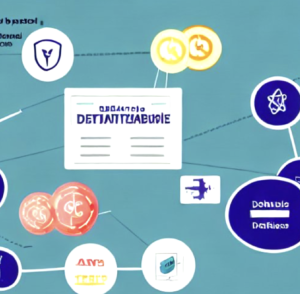
Decentralized finance (DeFi) is a rapidly growing trend in the cryptocurrency market. DeFi refers to a new financial system that is built on blockchain technology and is designed to be open, transparent, and accessible to everyone.
The most popular DeFi applications are decentralized exchanges (DEXs) and lending protocols. DEXs allow users to trade cryptocurrencies without the need for a central intermediary, while lending protocols allow users to borrow and lend cryptocurrencies in a trustless manner.
DeFi has the potential to revolutionize the way we think about and use money. It could make financial services more accessible to people who are currently unbanked or underbanked, as well as provide new opportunities for earning and saving money. Additionally, DeFi could also bring more transparency and security to financial transactions, as well as reducing the risk of fraud and censorship.
DeFi is still a relatively new concept, and it’s difficult to predict exactly how it will shape the future of the cryptocurrency market. However, it’s clear that DeFi has the potential to disrupt traditional financial systems and to create new opportunities for people to access and use money in ways that were previously not possible.
In conclusion, Decentralized finance (DeFi) is a rapidly growing trend in the cryptocurrency market that could shape the future of the way we think about and use money. DeFi is built on blockchain technology and is designed to be open, transparent, and accessible to everyone, this could make financial services more accessible to people who are currently unbanked or underbanked, as well as provide new opportunities for earning and saving money. Additionally, DeFi could also bring more transparency and security to financial transactions, as well as reducing the risk of fraud and censorship. It’s difficult to predict exactly how it will shape the future of the cryptocurrency market but it’s clear that DeFi has the potential to disrupt traditional financial systems and to create new opportunities.
Decentralized finance (DeFi) is still a relatively new concept, and there are a plethora of platforms that have been developed in recent years. Some of the most popular DeFi platforms include:
- Uniswap: A decentralized exchange (DEX) that allows users to trade Ethereum-based tokens without the need for a central intermediary.
- Aave: A lending protocol that allows users to borrow and lend cryptocurrencies in a trustless manner.
- MakerDAO: A stablecoin platform that allows users to collateralize their assets to generate a stablecoin called DAI.
- Compound: A lending protocol that allows users to lend and borrow assets, earning interest in the process
- Chainlink: A decentralized oracle network that provides external data to smart contracts on the blockchain.
- Kyber Network: A decentralized liquidity network that allows for the instant exchange and conversion of digital assets.
- Yearn.finance: A yield farming platform that allows users to maximize returns on their cryptocurrency investments
- Bancor: A decentralized liquidity network that allows for the creation of customizable tokens.
These platforms have been gaining popularity among users and developers alike, because they provide a transparent, secure and accessible way of financial transactions, and they have the potential to disrupt traditional financial systems. However, it’s important to remember that these platforms are still in their early stages and they may have some technical glitches and security risks. Therefore, it’s important to conduct your own research and to be aware of the risks before using any of these platforms.
In conclusion, Decentralized finance (DeFi) has a plethora of platforms that have been developed in recent years, some of the most popular platforms include Uniswap, Aave, MakerDAO, Compound, Chainlink, Kyber Network, Yearn.finance, and Bancor. These platforms provide a transparent, secure and accessible way of financial transactions, and they have the potential to disrupt traditional financial systems. However, it’s important to conduct your own research and to be aware of the risks before using any of these platforms.
Be First to Comment